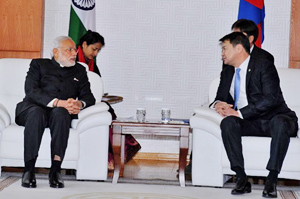Ulan Bator, May 17: India today announced a credit line of USD 1 billion to Mongolia to expand its economic capacity and infrastructure, as they decided to upgrade their relationship from Comprehensive to "Strategic Partnership".
Narendra Modi, the first Indian Prime Minister to visit Mongolia, held wide ranging talks with his counterpart Chimed Saikhanbileg here following which the two sides inked 14 agreements covering defence, cyber security, agriculture, renewable energy and health sector.
"I am pleased to announce that India will provide a Line of Credit of USD one billion to support expansion of Mongolia's economic capacity and infrastructure," Modi said at a joint press interaction with Saikhanbileg at State Palace.
Asserting that Mongolia is an integral part of India's Act East Policy, he said the destinies of the two countries are closely linked with the future of Asia Pacific Region.
"We can work together to help advance peace, stability and prosperity in this region," the Prime Minister said.
"In a reflection of our commitment to further deepen our relationship, we have decided to upgrade our Comprehensive Partnership to 'Strategic Partnership'," he said.
Stating that it was a great honour to be the first Prime Minister of India to visit Mangolia, Modi said, "It is a special privilege to come on the occasion of two important milestones that unite us – 25 years of democracy in Mongolia and 60 years of diplomatic relations between our two nations."
Commenting on his counterpart Saikhanbileg's remarks that India is the "spiritual neighbour and third neighbour" of Mongolia, Modi said, "We will always fulfil the responsibility that comes with this honour."
"I was very pleased with my discussions with Prime Minister today. We have strong convergence of views on bilateral relations and our regional and international partnership," he said.
"The agreements that we have just signed speak to the depth of the relationship. These cover economic relations, development partnership, defence and security, and people-to-people contacts," the Prime Minister added.
Modi said the cooperation between National Security Councils of the two countries will provide a strategic framework for cooperation.
India will also help establish a cyber security centre in Mongolia's defence and security establishment.
"We attach high importance to our security cooperation. We will continue to participate in each other's defence exercises. The agreements today will deepen our cooperation in border security and cyber security," Modi said.
Noting that the trade and investment relations between two countries are modest, Modi said, "We will take our economic partnership to a new level."
"There is huge potential in civil nuclear sector, mining, healthcare, pharmaceuticals and dairy. We should also explore the possibilities of using digital technology to expand our economic relations," he said.
He also announced to increase the ITEC training slots for Mongolia from 150 to 200 and establish an India-Mongolia Joint School.
"I conveyed to Prime Minister that we greatly value our international partnership, which is based on our friendship, shared spiritual heritage and democratic values. These also provide solid foundation for our cooperation in our region," Modi said, adding that the two countries are starting a "new era in our partnership".
The Prime Minister also thanked Mongolia for its strong support for India's permanent membership of UN Security Council.
Modi, who arrived here last night on the second leg of his three-nation tour, was earlier given a ceremonial welcome at the State Palace.
India has a strong linkage of Buddhism and democracy with Mongolia and was the first country outside the Soviet bloc to establish diplomatic relations with it.
India feels that there is excellent potential for cooperation with Mongolia in the minerals sector. Mongolia is mineral-rich country in coking coal, copper, rare earths and uranium.
India already has a civil nuclear agreement with Mongolia which provides for uranium exports to the country once the domestic laws here permit prospecting and mining.






Comments
Add new comment